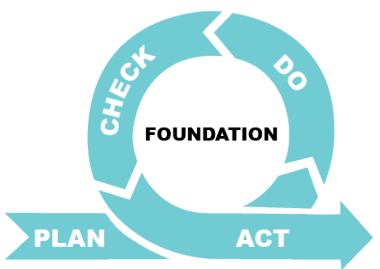Phase 1 - Foundation

In Phase 1, EPP and district partners focus on building trust and creating a shared understanding of partnership needs and expectations through open and authentic communication. A systematic approach to partnerships sets the tone for how each partnering organization will engage in this work.
The essential aspects of the foundation phase guide new partners as they establish their partnership. Experienced partners may also revisit this phase when significant EPP or district changes occur (e.g., leadership, shifts in partner needs, programmatic, funding, etc.).
Suggested Timeframe: 3-12 Months
Essential Aspects of Founding or Establishing Effective Partnerships:
- Build trust and establish openness.
- Establish processes and procedures for partnership work.
- Share, analyze, and utilize partner data.
- Set initial partnership vision and goals.
- Develop initial action plans.
- Who from the EPP and from the district should be directly engaged in the partnership work?
- Are partnership members from both the EPP and the district able to clearly articulate the partnership’s vision and goals?
- Are others outside of the core partnership members (i.e., other EPP/district faculty and staff) aware of the partnership’s vision and goals?
- Are others, both within the EPP and the district, who have a role in supporting the partnership’s vision and goals aware of their roles and responsibilities in the partnership?
- What are the key data sources that will inform the work of the partnership?
- Is the district identifying hiring needs as early and specifically as possible?
- Are there mechanisms in place to ensure that the district shares its hiring needs with the EPP as early as possible?
Process Considerations
- Establish Partnership Norms – Productive conversations about group norms help build trust within the partnership. Group norms are mutually agreed-upon guidelines for behavior amongst partners for the duration of the partnership.
- Develop Operating Principles – Operating principles represent how partners will carry out the various aspects of partnership work. Similar to the group norms, establishing operating principles through a facilitated process can help establish trust within the partnership. An example of partnership operating principles is available here
- Set Initial Vision and Goals – Based on agreed-upon expectations for program completers as well as district specified needs, partners establish the overall vision for the partnership as well as the goals necessary to meet this vision. Goals set the foundation for action planning and implementation to drive program improvements.
- Conduct Regular Meetings – Partners decide the frequency, duration, and format of meetings based on the partnership goals. Partners may meet monthly during the foundational phase of the partnership, then make adjustments as necessary during the development and sustainment phases. Existing meetings can be re-purposed or extended to integrate partnership work.
- Share Organizational Data – Through reports produced by the department of education and the State Board of Education, EPPs and districts have access to a wide range of information related to educator preparation provider and program performance as well as district needs. Partners must develop a clear understanding of the data sources available to EPPs and districts that can impact partnership focus areas and decision making. For more information on Human Capital Data Reports, the Teacher Preparation Report Card and Annual Reports, click here.
- Use Data Intentionally – Partners analyze, discuss, and use data to drive partnership action.
- Assess Partnership Needs – Partners use the results of their Primary Partnership Inventory and/or a Strengths, Weakness, Opportunities, and Threats (SWOT analysis) to inform early decision making and to support continuous improvement as the partnership moves into the development or sustainment phases.
- Identify Core Participants – Partners identify core partnership members from each organization.
- Determine Strategic Leads – Strategic leads for each partner organization should be responsible for coordinating and communicating partnership activities. Both the EPP and the district strategic leads should possess the leadership skills and organizational authority necessary to commit the necessary resources.
- Identify Roles and Responsibilities – Partners mutually agree on participants’ roles, responsibilities, and expectations, clearly communicating these to all participants.
- Initiate Partnership Agreement – Partners address the partnership agreement prompts and outline the key steps, timelines, necessary resources, and measures of success.
- Develop Initial Action Plans – Partners focus on development of one or two action plans during this phase as a way of working together toward a common goal. These initial plans should connect to the initiation of the partnership agreement. Partners should begin considering how they will expand action planning and implementation during the development phase.
- Monitor and Evaluate – Partners include benchmarks and measures for monitoring and evaluating action plan progress.